
The Mid-Shore Pancreatic Cancer Foundation, Inc., led by Foundation President Bill Shrieves (second from right) recently hosted University of Maryland Medical System physicians Dr. Jason K. Molitoris (left), Dr. Yixing Jiang (second from left) and Dr. Nader Hanna (far right) to speak on “New Trends in Pancreatic Cancer Diagnosis and Treatment” at Chesapeake College
Pancreatic cancer is a relatively rare cancer, representing only 3 percent of estimated new cancer diagnoses each year. However, it is especially lethal – presently the 3rd leading cause of cancer death, pancreatic cancer kills more than 50,000 Americans every year.
For the Mid-Shore Pancreatic Cancer Foundation, Inc., supporting efforts to advance the diagnosis and treatment of pancreatic cancer, and educating the public about risk factors and symptoms of the disease are key strategies for saving lives. On this year’s World Pancreatic Cancer Awareness Day (November 16), the Foundation sponsored a seminar, “New Trends in Pancreatic Cancer Diagnosis and Treatment,” in the Cadby Theatre at Chesapeake College in Wye Mills, Md.
Designed for clinicians involved in patient care, the evening program featured presentations by three leading University of Maryland Medical System oncology specialists: Nader Hanna, MD, Professor of Surgery, UM School of Medicine (UM SOM) and Director of Clinical Operations, Division of General & Oncologic Surgery, University of Maryland Medical Center (UMMC); Yixing Jiang, MD, PhD, Professor of Medicine, UM SOM and Director of GI Medical Oncology, Marlene and Stewart Greenebaum Cancer Center, UMMC; and Jason K. Molitoris, MD, PhD, Associate Professor of Radiation Oncology, UM SOM, Associate Medical Director, Department of Radiation Oncology, UMMC, and Director, Clinical Hyperthermia Program.
Dr. Hanna provided an overview of various risk factors for pancreatic cancer, including heredity (indicating a family history of certain genetic mutations) and smoking, and noted that symptoms of the disease, such as weight loss, back pain, jaundice and adult-onset (over age 65) diabetes most often don’t present until the disease is relatively advanced. He also reviewed various diagnostic strategies and surgical approaches, stressing the importance of surgical resection as the most significant factor for survival.
Dr. Jiang discussed the genetic aspects of pancreatic cancer and how chemotherapy drugs are tailored to address the specific mutations identified in individual patients. She noted that systemic chemotherapy provides curative results for less than 30 percent of patients, and that side effects can be very severe; however, in many cases it does improve survival time and also palliates cancer-related symptoms.
Dr. Molitoris described the role of radiation in treating pancreatic cancer, including challenges caused by the location of the pancreas near other tissues that can be damaged by radiation. He described the criteria for cases in which radiation is employed prior to surgery to shrink tumor size, or after surgery to palliate complications from the disease and improve quality of life.
“We were really pleased to have a good turnout for this event, and the presenters provided very clear and detailed updates from the standpoint of their practice,” said Bill Shrieves, president of the Mid-Shore Pancreatic Foundation, Inc. “The Foundation does a lot to support pancreatic cancer patients and to raise funds for research on the disease, but as one of our volunteers commented, this event might be the most important thing we’ve done as an organization. If just one of the clinicians who attended does something different based on the information that was shared and it improves the outcome for a pancreatic cancer patient, that is the best kind of success.”
Shrieves also credited support from Tidewater Rotary in making the event possible. “A generous grant of $5,000 from Rotary’s Flags for Cancer Program made it possible for us to offer this event free of charge, and we are very grateful for that support,” he said.
Established in 2013 The Mid-Shore Pancreatic Cancer Foundation, Inc., sponsors and participates in events that raise awareness about pancreatic cancer in the community, and also helps patients and their families in the Mid-Shore region find assistance, financial support, and transportation to and from treatments. The group also funds research through direct grants or support for other organizations, such as the Pancreatic Cancer Action Network.
For more information about The Mid-Shore Pancreatic Cancer Foundation, Inc., visit https://www.midshorepancan.org/ or call 410-745-9243.



Write a Letter to the Editor on this Article
We encourage readers to offer their point of view on this article by submitting the following form. Editing is sometimes necessary and is done at the discretion of the editorial staff.